West Bank tension turns commercial hub of Huwara into a ghost town
The main road in Huwara, a town of around 7,500 inhabitants, is a strange point of confluence. In calmer times, Jews and Arabs alike repaired their cars here because it was cheaper. Now it is a hot spot of conflict

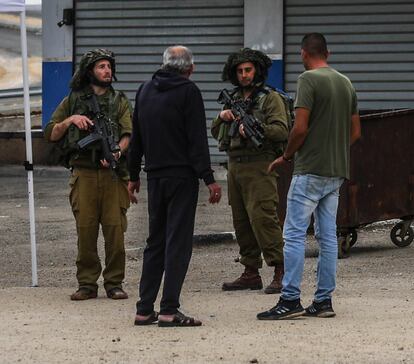
Like a naughty child, Ahmed reveals a wooden ladder in the backyard of his property. He agrees to being photographed in exchange for not providing his real name, lest the Israeli army discover the secret that allowed him to leave the house for weeks without using the front door, which opens onto a road with more soldiers than local residents, more stray dogs than cars, and an endless row of around 500 shuttered stores, which have been closed by military order since early October. “The ladder spared me two problems: the soldiers not letting me walk on the sidewalk, and being attacked by a settler,” he says next to one of the many automobile dealers whose sign, in Hebrew and Arabic, serves as a reminder that before becoming a ghost town, Huwara was synonymous with commerce as a place of passage. The road that Ahmed’s house faces crosses the West Bank vertically, serving both locals and Israeli settlers, who in this area are particularly distinguished by their ideological-religious fervor.
In a West Bank based on separation (segregated roads, restrictions on movement...), the main road in Huwara, to the south of the city of Nablus and with around 7,500 inhabitants, is a strange point of confluence. In calmer times, Jews and Arabs alike repaired their cars here because it was cheaper. Now it is a hot spot of conflict, even before the war in Gaza spilled over into the West Bank, leading to an average of three Palestinian deaths a day, mass arrests, raids, riots, growing support for Hamas claims and more and more restrictions. In August, two Israelis were killed at a car wash. The army arrested the alleged assailant last month (he has not yet been tried) and demolished his family home last Tuesday.
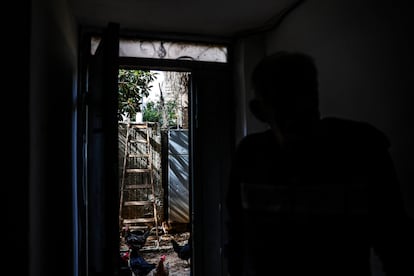
On October 5, two days before the Hamas attacks on Israel, an ultra-right-wing Israeli MP stood — hyper-protected by soldiers — on the same road to set up one of the tabernacles for the Jewish holiday of Sukkot, while ultra-nationalist settlers raided stores and held a Torah class. The provocation, in retaliation to an attack hours earlier, ended with both sides throwing stones at each other and one Palestinian shot dead by a settler.
As on previous occasions, the army’s response was collective punishment of Huwara. It ordered the closure of all businesses along the road: gas stations, bakeries, workshops, grocery stores, shawarma restaurants, as well as stores selling credit for cell phones and the purchase of stone from a nearby quarry. “Our lives matter more than the Palestinians’ freedom of movement,” said the ultra-nationalist Minister of National Security, Itamar Ben-Gvir.
Last February, dozens of radical settlers recorded themselves praying with flames in the background after killing a Palestinian and setting fire to dozens of his homes and vehicles. Another religious-Zionist politician, Finance Minister Bezalel Smotrich, defended “erasing Huwara.” But by soldiers, not civilians, he later clarified.
Today, the 1,200 Israelis killed in the October 7 attacks are visible on the soldiers’ nerves. They take no more than two minutes to dissolve any conversation on the sidewalk. The ruins of a pizzeria demolished for illustrating a Facebook post with the image of an elderly Israeli woman taken hostage by the militia can still be seen.

Ahmed, however, is happy, because it is Friday and for the first time since September, he can go to the mosque on the other side of town to pray. The ban on crossing the road has been lifted, although the blockade of almost all accesses from the side streets remains in place. The army maintains security barriers, large concrete blocks or mounds of sand, that force the inhabitants to make long detours that turn a few minutes’ journey into an odyssey.
Ahmed’s son Alaa returns from Nablus loaded with plastic bags full of diapers and food. He does his shopping there — the Palestinian National Authority (PNA) is in charge and there are plenty of stores open — taking advantage of the fact that he has permission to cross the military checkpoint because he works as a nurse in the city’s hospital. His children poke their heads through the bars of the windows. “They haven’t been able to go out for weeks. It’s no life. It affects their spirits. And the same soldier who used to play with them before [October 7] is now pointing his rifle at them,” he says.
The military allows a school minibus to cross for the first time in weeks. They register it at the checkpoint, while in the other direction, towards Jerusalem, cars with yellow Israeli license plates and passengers dressed like the ultra-nationalist settlers who rule in the area circulate without any issues. As the West Bank has been occupied since the 1967 Six-Day War, Palestinians are subject to military law and Israelis to Israeli civilian law.
The Israeli army has loosened its grip a little (50 stores on the road may reopen) because the Minister of Transport, Miri Regev, on November 12 opened a road for Israelis only, which is guarded by soldiers. The settler leadership has pushed for years for its construction in the face of increasing attacks, in order to be able to circulate without running into Palestinians. It serves the 8,000 inhabitants of four settlements associated with cases of violence against Palestinian civilians. The cost to the public purse is 43,000 shekels ($11,900) per settler, according to Israel’s leading pacifist NGO, Shalom Achshav (Peace Now).
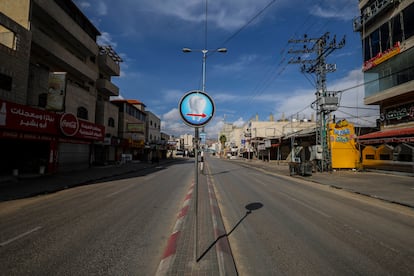
Although they can use the new road, the settlers still insist on using both. One of their activists, Rabbi Menachem Ben Shahar (who has said in a video it is “ethical and legitimate” to destroy all the houses in Huwara), believes that giving up the old road would give “a clear victory to the Nazi terrorists” in the town. The army relented after “strong pressure” from the area’s settler representative, Yossi Dagan, according to national television Channel 14.
“They want to show presence, to show that they can do this and to keep the stores closed,” says the mayor, Moin Dmeidi. He, on the other hand, had to coordinate for weeks with the Israeli military authorities to be able to move around or for the baker to bring bags of pitas to residents’ homes. He chooses his words carefully because he is in a delicate situation: Huwara is in the West Bank’s Area B, with security under Israeli control and day-to-day administration in the hands of the PNA, according to the division established in the 1993 Oslo Accords.
“Now in theory we can move around, but see, people don’t go out. They are afraid. More of the settlers than of the soldiers, who also protect them. Bu the soldiers too. Before you could even talk to them, and now you fear they will shoot at you,” says Murad Raziq Sharab, a 33-year-old mechanic who has run out of customers. All of them, he says, were Israelis. As he speaks, a group of military men drive up in an SUV to make it clear that the conversation cannot attract a group from forming.
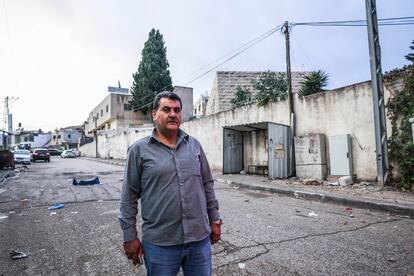
These days, the dimensions of the carrot and stick sometimes depend on the mood of the soldiers patrolling Huwara. “I could go downtown in the car, but I don’t dare. Sometimes they don’t let me pass and I’m always afraid they won’t let me go back home,” says Alaa.
The situation has eaten into Huwara’s pockets. It is noon and no one has yet entered the store owned by sisters Jitam and Itab Ahmad Udi, as they explain without a trace of self-pity. “It’s just that people have hardly any money left for the things we sell,” says Jitam. These are cosmetics and gifts made of plastic or paper. Cheap, but expendable. Suleiman Rami Odi, 28, is in a similar situation. He shows a long list of names jotted down in pen on white cardboard. “They’re all the ones I’ve entrusted today. They will give it to me. I can’t afford to charge them. They are people who were earning about 2,000 shekels [about $555], and now they are not working.”
The grocery store run by Karim Ahmed, 21, is on the “good side” of Huwara (the one that has not been forced to close), almost touching a yellow steel barrier that the soldiers can raise to allow access to the road, something that hasn’t happened since October 7. His shelves are half empty and there is no tobacco left, a product as coveted among Palestinians as hummus with pita bread itself. “The suppliers don’t dare come anywhere near,” he says. “And the soldiers aren’t here today. When three or four of them are standing outside, the customers don’t come either.” Before the war in Gaza, he estimates, he used to make around 4,000 to 5,000 shekels a month ($1,110 to $1,387); now he takes in about 1,000 ($277).
Ahmed shows security camera footage on his cell phone. Three soldiers are seen entering the store, stealing some lighters on the counter, and kicking things over on their way out. “Sometimes they take tobacco without paying and you can tell it’s not because of the money. It’s because they can,” he says. “To show they can.”
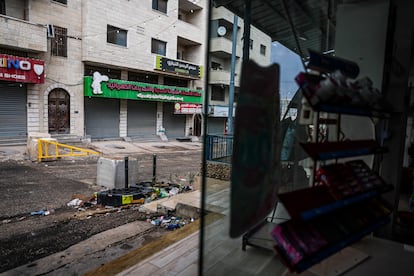
Sign up for our weekly newsletter to get more English-language news coverage from EL PAÍS USA Edition
Tu suscripción se está usando en otro dispositivo
¿Quieres añadir otro usuario a tu suscripción?
Si continúas leyendo en este dispositivo, no se podrá leer en el otro.
FlechaTu suscripción se está usando en otro dispositivo y solo puedes acceder a EL PAÍS desde un dispositivo a la vez.
Si quieres compartir tu cuenta, cambia tu suscripción a la modalidad Premium, así podrás añadir otro usuario. Cada uno accederá con su propia cuenta de email, lo que os permitirá personalizar vuestra experiencia en EL PAÍS.
¿Tienes una suscripción de empresa? Accede aquí para contratar más cuentas.
En el caso de no saber quién está usando tu cuenta, te recomendamos cambiar tu contraseña aquí.
Si decides continuar compartiendo tu cuenta, este mensaje se mostrará en tu dispositivo y en el de la otra persona que está usando tu cuenta de forma indefinida, afectando a tu experiencia de lectura. Puedes consultar aquí los términos y condiciones de la suscripción digital.








































